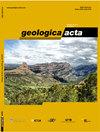土耳其安纳托利亚西北部比加半岛始新世中晚期海洋记录
IF 2
4区 地球科学
Q2 GEOLOGY
引用次数: 8
摘要
根据古生物、岩石和年代地层数据,对萨卡里亚板块和阿纳托利德-陶里德板块碰撞后首次海洋入侵比加半岛(土耳其西北部)的始新世浅海沉积物进行了调查。为了i)修订始新世浅海单元的地层学,以及ii)建立现代生物地层学背景和对比方案,研究了零星分布露头的大型底栖有孔虫(LBF)。Şevketiye组(Fm)在本文中被定义为一个主要的浅海碎屑矿床,其次级碳酸盐覆盖在Camlica变质岩上,并横向穿过Sogucak组,这是一个在色雷斯盆地广泛存在的碳酸盐单元。Şevketiye组中肺泡类、异盖类的原始发育阶段和正hragminids的记录表明,该地层是浅海底带(SBZ)16的一部分/17(卢泰晚期?/巴顿早期),SBZ17/18和SBZ19A(早期Bartonian/早期Priabonian)。另一方面,覆盖在始新世火山岩之上的Sogucak组产生了异盖岩、Spiroclypus sp.和Nummulites fabianii谱系的晚期发育阶段,这意味着始新世晚期(最早的Priabonian;SBZ19A)发生了更年轻的海洋入侵。在普里亚博尼安,Ceylan Fm的深海碎屑岩和火山碎屑岩的沉积标志着沉积体系的急剧变化。总之,始新世海在卢特期晚期首先越过了Gokceada(在爱琴海),然后到达了巴托尼安的Biga和Gelibolu半岛,并最终导致比加半岛和色雷斯盆地在晚巴顿阶和普里亚博阶广泛沉积碳酸盐岩和硅碎屑岩。本文章由计算机程序翻译,如有差异,请以英文原文为准。
Middle-Late Eocene marine record of the Biga Peninsula, NW Anatolia, Turkey
The Eocene shallow marine deposits marking the first marine incursion in the Biga Peninsula (NW Turkey) after the collision of the Sakarya and Anatolide-Tauride plates were investigated based on paleontological, litho- and chrono-stratigraphic data. Larger Benthic Foraminifera (LBF) from patchily distributed outcrops were studied in order to i) revise the stratigraphy of Eocene shallow marine units, and ii) establish a modern biostratigraphic setting and a correlation scheme. The Şevketiye Formation (Fm.) is herein defined as a predominantly shallow marine clastic deposit with subordinate carbonates overlying the Camlica metamorphic rocks, and passing laterally to the Sogucak Fm., a carbonate unit that is widely represented in the Thrace Basin. The record of alveolinids, primitive developmental stages of heterosteginids, and orthophragminids in the Şevketiye Fm. suggests that this formation is part of the Shallow Benthic Zones (SBZ) 16?/17 (Late Lutetian?/Early Bartonian), SBZ17?/18 and SBZ19A (Early Bartonian/earliest Priabonian). The Sogucak Fm., which overlies the Eocene volcanics, on the other hand, yielded advanced developmental stages of heterosteginids, Spiroclypeus sp. and Nummulites fabianii lineages, implying a younger marine incursion during the Late Eocene (earliest Priabonian; SBZ19A). A drastic shift in the depositional regime is marked amid Priabonian by the deposition of deep-marine clastics and volcanoclastics of the Ceylan Fm. In conclusion, the Eocene Sea transgressed first Gokceada (in the Aegean Sea) during the Late Lutetian, then reached the Biga and Gelibolu peninsulas in the Bartonian, and finally led to the widespread deposition of carbonate and siliciclastic rocks in the Biga Peninsula and the Thrace Basin during the Late Bartonian and Priabonian.
求助全文
通过发布文献求助,成功后即可免费获取论文全文。
去求助
来源期刊

Geologica Acta
地学-地质学
CiteScore
2.50
自引率
6.70%
发文量
13
审稿时长
>12 weeks
期刊介绍:
- Relevant conceptual developments in any area of the Earth Sciences.
- Studies presenting regional synthesis.
- Thematic issues or monographic volumes presenting the results from one or more research groups.
- Short papers reflecting interesting results or works in progress.
- Contributions and results from Research Projects, Workshops, Symposiums, Congresses and any relevant scientific activity related to Earth Sciences.
- Geologica Acta aims to stimulate rapid diffusion of results and efficient exchange of ideas between the widespread communities of Earth Science researchers (with special emphasis on Latinamerica, the Caribbean, Europe, the Mediterranean
 求助内容:
求助内容: 应助结果提醒方式:
应助结果提醒方式:


